We’ve been compiling your responses to our annual workforce survey, our second, which highlights trends in what is happening for social workers across the sector. We will be releasing the results on the SWRB website next month but I thought you would be interested in some of the headlines which have become apparent. For example, nearly half of all those surveyed had been in their current role for two years or less, and this was not just new graduates but across all age groups, which indicates a lot of change for social workers and their workplaces. Nearly one in four of those surveyed said they intended leaving social work, for a number of reasons, while another trend was finding that younger social workers were more likely to work for NGO and/or iwi employers.
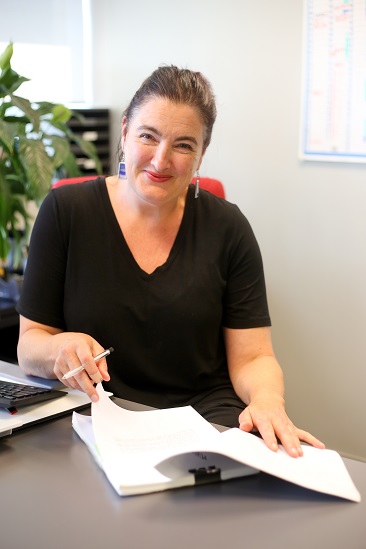
Thank you to those who took part, who were a proportion of those on the register, so the results need to be considered in that light. You can check our SWRB website in December for the results.
There have been questions recently about who are the people who make the decisions around registering social workers. You may already know that we take registration seriously and there is a rigorous process in place to ensure social workers who come onto the register are competent, fit to practise, and will be held accountable for the way in which they practice. This protects your reputation and that of the profession as we work to ensure that the public can be confident social workers adhere to a Code of Conduct, receive supervision, and undertake continuing professional development.
Your application and the documents you send in are carefully checked by the SWRB registration team and they are then sent to the Board of the SWRB. It is the Board, during its regular meetings, which makes the decision about whether you have met the criteria to be accepted onto the register.
The SWRB Board has seven members, four of whom are registered social workers. They have a long track record in social work, and in advancing the professionalism of social work. The Board chair is Shannon Pakura who was previously the president of ANZASW (Aotearoa NZ Association of Social Workers).
The decision to register a social worker is made with care and by other social workers who represent the best interests of the profession. In this way, we can build a fully professional workforce and enhance the standing of social work.
Sarah Clark, Chief Executive
On our roadshows
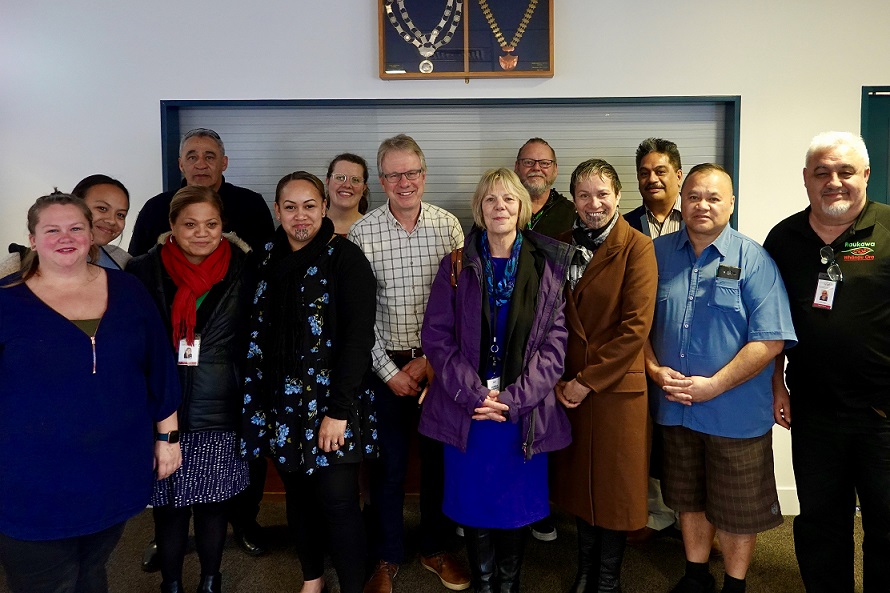
The SWRB has an information campaign getting under way where we are planning to visit a number of centres around Aotearoa as New Zealand moves to mandatory registration of all social workers. You’ll be hearing more about this early next year but we have already started getting out and about.
We were warmly welcomed by Raukawa Whānau Ora, Te Waiora, Oranga Tamariki, and Social Workers in Schools at Levin, in the lower north island. The kōrero was centred around the professional lives of social workers who talked about their experiences, at times with heart-felt passion and emotion. Social work students at Porirua’s Te Wānanga o Aotearoa also talked about the challenges they faced as did those at the Western Institute of Technology in Taranaki.
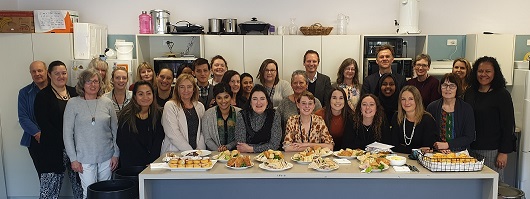
We shared a morning tea with social workers at Oranga Tamariki in Wellington and on a trip to Auckland, we discussed issues facing social workers at the Auckland and Counties Manukau District Health Boards. We felt privileged to be in all those spaces as stories were shared. The three big themes that emerged from our kōrero were:
- The importance of qualified supervisors to lift the professionalism of social workers. Questions were raised about the quality of supervision and preferences for external versus internal supervision.
- Pay parity and the stress placed on the NGO sector. Social workers in the health and statutory sectors acknowledged the pressure that their NGO social work colleagues are under and the importance of consistent pay and conditions across the social work sector.
- Competence to work with Māori. What does this look like for Māori and non-Māori social workers? How do we incorporate the principles of kaupapa Māori in education and practice?
Hearing from social workers is so important as we continue to develop policies for the workforce.
Andrew Thompson, Principal Advisor Social Work
Introducing our Senior Māori Advisor
Patsy Kainuku is our Senior Māori Advisor at the SWRB and has already made an impact on our policies and thinking in the short time since she has been here. Patsy grew up in the small rural town of Murupara at the foothills of her tūrangawaewae, Te Urewera. With the closure of the local wood mill as a child, the social issues faced by her community increased with the decrease in work.
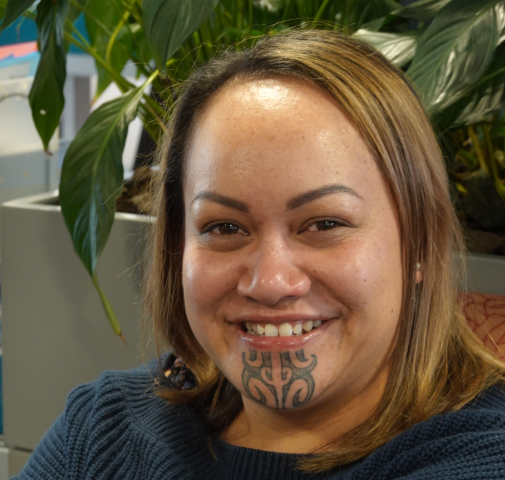
“Like many social workers, my attraction to the social work profession was mostly because of the injustices I faced growing up. The other part was seeing my older sister, who is also a registered social worker, graduate and be a strong advocate in her social work mahi,” says Patsy.
A registered social worker, Patsy completed her Bachelor of Social Work at Massey University and worked in Christchurch following the earthquakes with a focus on community needs. The family then moved to the Bay of Plenty where she was employed by the District Health Board in child, adolescent and adult mental health and addictions, including community, inpatient, needs assessment, addictions, high complex, and high risk. Patsy has also worked at Nga Mātaapuna Oranga, a kaupapa Māori Primary Health Organisation, where she provided supervision, mentoring and training for social workers and cultural/tangata whenua supervision to nurses, Whānau Ora workers, psychologists, and others.
Her ongoing dedication to the social work profession comes from the many people she has shared space with over the years and the responsibility she believes we all have to leaving the world in a better place for our mokopuna.
Patsy is passionate about whakawhanaungatanga, moving forward in a way that supports better outcomes for all people. She is keen to continue connecting with other social workers, hapū and iwi across Aotearoa, “The values of tika (what is right), pono (what is true) and aroha (love) guide me to ensure these relationships are maintained and nurtured.”
“I want to see our social work profession thrive for those already in the profession and those who will come after us. I want social work to be at the forefront of supporting Mauri Ora for our people, whanau and communities.”
He aha te mea nui o te ao? He
tangata, he tangata, he tangata
What is the most important thing in the world? It is people, it is people, it
is people.
Social work and identity
Over three recent months, Jessie Weber-Sparrow spent her social work student placement at the SWRB, and had this to say:
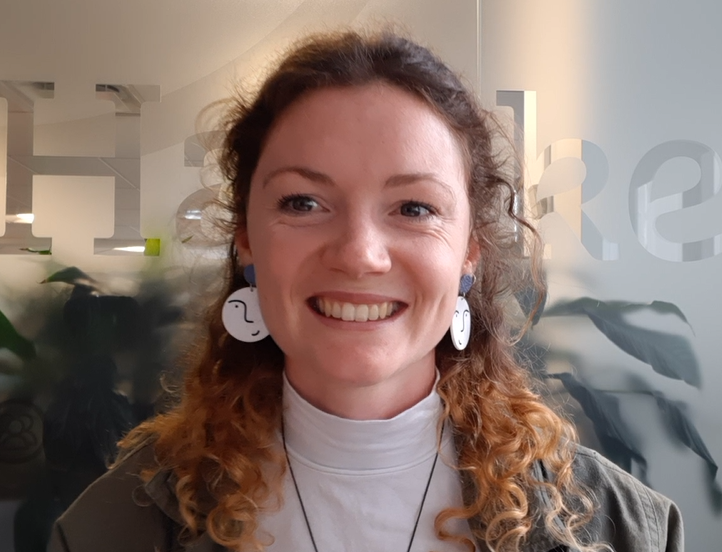
I really enjoyed the placement and learnt lots that will inform my future social work practice. It has been particularly helpful in strengthening my identity as a social worker and enhancing my understanding of the social work profession in Aotearoa New Zealand.
I was tasked with collating and reporting on the annual workforce survey data. This data is key in capturing and understanding the social work workforce in Aotearoa and hopefully it can be used to inform workforce planning and development. It was important to me to present the data in a way that was honest, accessible and concise, and that honoured the voices of the social workers who contributed. The SWRB’s desire and need to connect with social workers around the country to inform their decisions emphasised to me the need for a system where evidence informs practice and practice informs evidence.
An area I have been particularly interested in is identifying the unique strengths and skills that social workers bring to the social policy space. Within SWRB there are competent and passionate social workers who utilise their relational ability, value set and social work knowledge to inform their decisions and guide their work.
The strength-based conversations in the office around developing mana-enhancing processes for social workers to access registration has instilled a sense of confidence within me that registration is a beneficial and necessary step for the social work profession. The staff within SWRB consider the position of the social workers they interact with and they work hard to build whanaungatanga from the moment a social worker calls the organisation and onwards.
CPD log and audit
You will have received an email from us recently about the changes to the CPD log and how a percentage of logs will now be audited. If you are chosen to be audited, we will let you know in February.
We’ve developed a video about CPD and the changes which you can check out here. If that link doesn’t work for you, here’s the full URL: https://swrb.govt.nz/for-social-workers/continuing-professional-development/
CPD save the date
Save the date for a symposium to explore social work practice with Māori and Pasifika to contribute to your Continuing Professional Development. The symposium is being organised by the SWRB, ANZASW and Barnardos.
There are two opportunties:
- Rātū (Tues) 18th February – Wellington with keynote speaker Justice Joe Williams
- Rātū (Tues) 3rd March – Christchurch with keynote seaker Kiritahi Firmin
There will be further details released in January.
Social work and social change: macro social work in Aotearoa New Zealand
The aim of this study is to better understand how social workers effect social change and how you could incorporate this type of practice into your own role. The survey will ask questions about what you do in your role that’s related to social and/or community change, i.e. tasks outside clinical or work with individuals. This could relate to management and leadership, organisational development, community development, policy change, research and teaching in your paid or voluntary work.
If you would like more information, please contact Olivia LaMontagne at olivia.lamontagne@pg.canterbury.ac.nz. If you would like to take part, please click the following link.
Rātū (Tues) 18th February – Wellington with keynote speaker Justice Joe Williams
Rātū (Tues) 3rd March – Christchurch with keynote seaker Kiritahi Firmin
There will be further details released in January.

